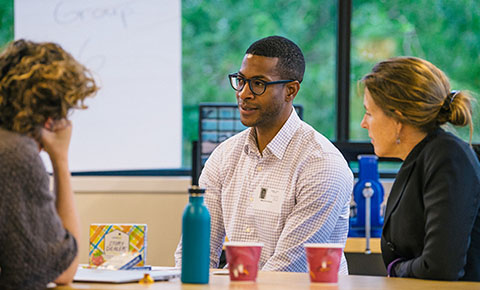Inequality and the ‘American Dream’
 Rising economic inequality can weaken the motivating belief that it’s possible to climb the socioeconomic ladder, Northwestern University’s Mesmin Destin said during a Brookings Institution webinar on how parenting, schools, media and other cultural factors can impact the lives of children.
Rising economic inequality can weaken the motivating belief that it’s possible to climb the socioeconomic ladder, Northwestern University’s Mesmin Destin said during a Brookings Institution webinar on how parenting, schools, media and other cultural factors can impact the lives of children.
Believing in the so-called “American Dream” is often a powerful motivator for people, says Destin, a psychologist and associate professor of human development and social policy in the School of Education and Social Policy.
But the growing gap between the rich and the poor, “makes upward mobility feel less possible among economically disadvantaged youth, and can have negative consequences for their motivation and school behavior, a finding that should influence public policy,” Destin said.
Destin, a social psychologist, was one of four authors who spoke about their research that appears in the latest issue of “Future of Children” a biannual academic journal published by Princeton University and the Brookings Institution. A faculty fellow with Northwestern's Institute for Policy Research, he also recently won the Outstanding Early Career Award from The International Society for Self and Identity.
In the current issue, “How Cultural Factors Shape Economic Outcomes,” Destin wrote about the role of beliefs, expectations, and perceptions of economic mobility, and the impact it has on people as they’re pursuing their goals.
Researchers studying whether social mobility is possible have no definitive answers. They’ve shown that those who start at lower income levels can improve their standing. But there’s also a great deal of stickiness, Destin says: Your family’s economic background is strongly associated with where you might end up as well.
Destin’s work extends beyond social mobility rates. Instead, he looks at people’s beliefs about these rates, or what some call “the American Dream." He asks how much do people believe they can move up the economic ladder? "There may be variation in these beliefs that's meaningful," he says.
Research suggests people both overestimate and underestimate the amount of mobility that happens in society. Destin looked at this uncertainty and examined how these beliefs may affect young people in both positive and potentially negative ways.
Destin’s research with high school and college students suggests that the greater one’s belief in the existence of social mobility, the higher the motivation to pursue academic goals. People feel that there’s a purpose; pursuing academic goals will pay off and they're earning higher grades.
On the flip side, the greater the belief in mobility, the more likely one is to be satisfied with current rates of mobility that exists in society. This means people can be more tolerant of the high levels of inequality in society.
“You may be more likely to develop these biased attributions about people's lives,” Destin said. “So if you believe there's lots of mobility, you're more likely to explain people's life outcomes as solely a result of their individual achievements or failings and ignore some of the structural barriers that may be a strong factor.”
Destin stresses “the importance of policies and programs that actually increase opportunities for mobility and reduced inequality in tangible ways that can have these multiple positive effects for young people.”
The journal was edited by edited by Melissa Kearney, Neil Moskowitz Professor of Economics at the University of Maryland; and Ron Haskins, senior fellow emeritus in the Economic Studies program at the Brookings Institution.
In addition to Destin, author panelists included Rebecca Ryan, professor in the psychology department at Georgetown University, on parenting practices and socioeconomic gaps in children’s outcomes; Phil Levine, professor of economics at Wellesley College, on the impact of role models and media on children’s outcomes; and Melanie Wasserman, labor economist on the faculty of UCLA Anderson School of Management, on the disparate ways that family structure affects outcomes for different groups of children.